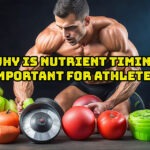Nutrient timing is a popular concept in sports nutrition that focuses on the timing of nutrient intake around exercise to optimize performance and recovery. Proper nutrient timing can help athletes maximize their training gains, improve endurance, reduce muscle damage and inflammation while also minimizing fatigue.
In this article, we will discuss the importance of nutrient timing strategies for athletes, what to eat before, during and after exercise to maximize your performance and recovery.
Why is Nutrient Timing Important for Athletes?
During exercise, our body’s energy demands increase significantly. The type of fuel we use during exercise depends on several factors such as intensity, duration and type of activity performed. For example: High-intensity exercises rely more on carbohydrates (stored glucose in muscles) than fat stores for energy; whereas low-intensity exercises like walking or yoga primarily rely on stored fats rather than carbohydrates.
Therefore it’s essential to provide adequate nutrients at the right time so that our bodies can utilize them effectively during different types of activities. This approach helps ensure optimal performance without compromising long-term health goals such as maintaining healthy body weight or avoiding chronic diseases like diabetes.
What to Eat Before Exercise
The goal of pre-workout meals/snacks is to provide enough fuel (primarily from carbohydrates) for the upcoming workout without causing digestive discomfort or sluggishness. Ideally one should aim to consume 1-4 grams/kg body weight carbs depending upon the intensity/duration/type of activity planned within 30 minutes -3 hours prior session start time.
Some examples include:
- A slice of whole-grain toast with peanut butter & banana
- Greek yogurt mixed with berries & granola
- Smoothie made up using fruits/veggies nuts/seeds milk/yogurt.
- Oatmeal topped with almond butter/honey & fresh fruit
Additionally eating some protein around 20gms may help stimulate muscle repair/recovery post-exercise but too much isn’t beneficial pre-session since it takes longer to digest.
What to Eat During Exercise
The primary goal of fueling during exercise is to maintain blood glucose levels and prevent dehydration while avoiding gastrointestinal discomfort. This can be achieved by consuming simple carbohydrates such as sports drinks, energy gels or chews every 30-60 minutes for sessions over an hour in duration.
Some examples include:
- Sports drink containing electrolytes & carbs
- Energy gel/chew
- Banana/apple slices
For activities lasting less than an hour, water intake alone may suffice unless the athlete has high sweat rates or intense session on a hot day where additional electrolyte replacement maybe needed.
What to Eat After Exercise
Post-exercise nutrition plays a critical role in recovery. The main objective is to replenish glycogen stores (stored carbohydrates) and provide protein for muscle repair/recovery. Ideally one should consume approx 20gms protein within 2 hours post-session along with some carbohydrate-rich foods at around 1gm/kg body weight – this helps maximize insulin secretion which pushes nutrients into cells faster leading towards quicker recovery & adaptation process.
Some examples include:
- Grilled chicken breast with sweet potato mash
- Tuna salad wrap with whole-grain bread/lettuce leaves.
- Quinoa bowl topped up mixed veggies like bell peppers/tomatoes/spinach roasted chickpeas, feta cheese drizzled with olive oil dressing.
In addition, it’s essential to rehydrate adequately after exercise by drinking plenty of fluids (water/electrolyte-containing beverages).
Conclusion
Proper nutrient timing strategies are crucial for athletes looking to optimize their performance and recovery from training. Eating the right types of foods before, during and after exercise can help improve endurance, reduce muscle damage/inflammation while maximizing gains made through training adaptations. It’s important not only what you eat but also when you eat it that matters most!
Самый большой платный материал о спортивном питании по этой ссылке
The video was made using the Pictory neural network














